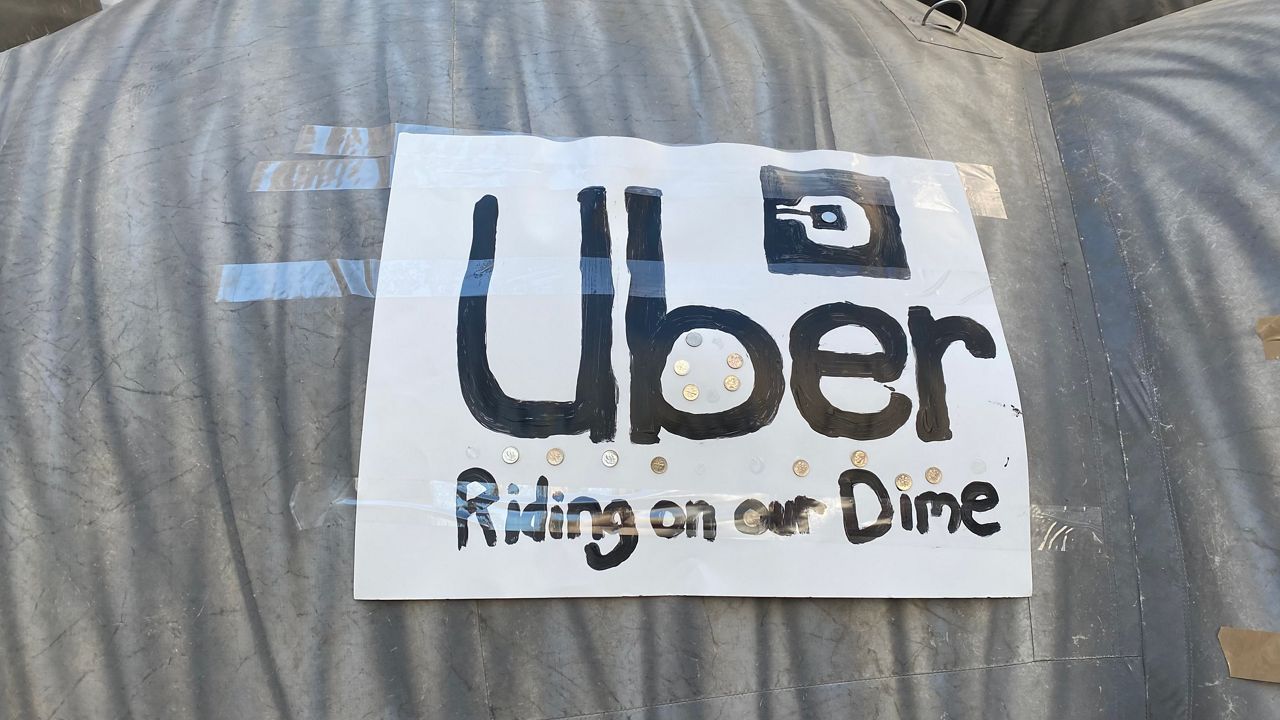LOS ANGELES — It’s been four months since California voters approved Prop 22, the controversial ballot initiative that allowed Uber, Lyft, and other app-based driving companies to continue classifying their workers as independent contractors instead of employees with benefits.
But activist drivers continue to take Prop 22 to task. Members of the Los Angeles-based lobbying group, Rideshare Drivers United, rallied in downtown L.A. Tuesday to support a federal bill called the PRO Act that would grant gig workers the right to organize and negotiate the terms of their contracts.
“What the voters didn’t realize with Prop 22 is that they provided Uber and Lyft a pass,” said Esterphanie St. Juste, an Uber driver since 2015 and a Rideshare Drivers United organizer. “The pass you pay for, we pay for, because as a full-time driver, I’m on Medi-Cal. That's the taxpayer’s money.”
Like many of the Uber and Lyft drivers at Tuesday’s rally, St. Juste was wearing a lime green T-shirt encouraging fellow drivers to join the group. Many of them held signs that said, “Uber: Riding on our Dime” and “Pass the PRO Act Now!” as divers passed by, honking their approval.
Held on the 300 block of Spring Street in front of the California State Building, the event was meant to call attention to the government picking up the check for unemployment, health insurance, and other benefits that would have been paid by Uber and Lyft had they been forced to reclassify their drivers as employees.
“Uber believes we should advance policies that improve independent work," a company spokesperson told Spectrum News 1. "We will continue to work collaboratively with policymakers and our diverse community of earners on meaningful solutions to improve the quality and security of independent work.”
Uber pointed to a survey it conducted last summer that found 82% of its drivers support the company's plan to continue classifying them as independent contractors while providing access to some benefits, such as occupational accident insurance. Drivers preferred flexibility to employment benefits three to one, Uber said.
Those survey results didn't stop rideshare organizers from using a giant inflatable rat as a symbol of the companies for which they work “who have stolen from the public coffers by misclassifying their drivers and shirking taxes meant to provide a safety net for workers like app-based drivers, especially during a pandemic,” Rideshare Drivers United said in a statement.
Eduardo Romero was among several dozen drivers who were protesting. Before COVID, the 58-year-old had been driving for Uber full time for three years. Having high blood pressure and diabetes, it’s too risky, so he’s currently on pandemic unemployment assistance paid, in part, by California.
“For me, all the taxpayers pay to the state. Why not Uber and Lyft pay too? It’s not just,” Romero said. “For this reason we are here.”
The PRO Act rally in L.A. was one of three held simultaneously throughout the state. Rideshare protesters in San Francisco assembled in front of Uber headquarters. In San Diego, they gathered in front of the San Diego State Building.
The PRO Act was first introduced by Democrats in the House of Representatives in 2020 and re-introduced in both houses of Congress in February. If passed, the Protecting the Right to Organize (PRO) Act of 2021 would dramatically alter federal labor law.
In addition to allowing workers currently classified as independent contractors to be reclassified as employees for the purpose of union organizing, the bill would prevent employers from being able to permanently replace striking workers with non-union labor and impose penalties on companies that violate labor laws.
